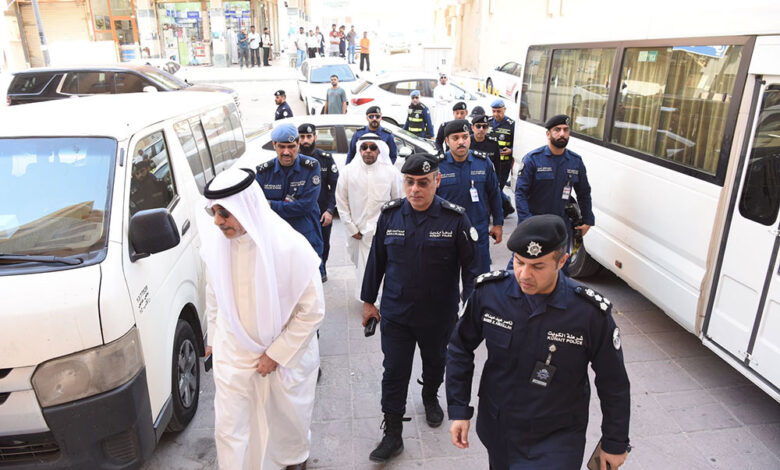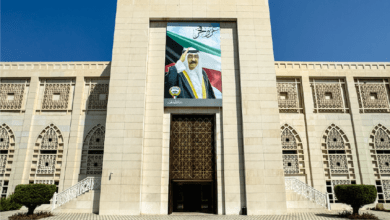Kuwait reshapes security landscape, zero-tolerance for violations

The Times Kuwait Report
Under the wise leadership and guidance of HIs Highness the Amir Sheikh Meshal Al-Ahmad Al-Jaber Al-Sabah and His Highness the Crown Prince Sheikh Sabah Al-Khaled Al-Hamad Al-Sabah, Kuwait has been reshaping its security landscape, with emphasis on protecting public interests, equality before the law and zero-tolerance towards law violations.
Spearheading this security transformation is First Deputy Prime Minister and Minister of Interior Sheikh Fahed Al-Yousef Al-Sabah, who has managed in a remarkably short span of time to not only curb security violations and restore order in Kuwait, but also revive public confidence in the strength and integrity of state institutions. In particular, the Interior Ministry has exerted all efforts to enhance public trust in its functioning through transparency, fairness, and accountability, while ensuring that its policies serve the best interests of the nation and people.
As Minister of Interior, Sheikh Fahed has combined strategic vision with decisive action, steering the country through one of its most challenging security landscapes with unwavering determination. By confronting entrenched criminal networks, dismantling sophisticated forgery rings, and launching wide-ranging reforms, Under the sagacious guidance of the country’s leadership, he has proven himself a guardian of Kuwait’s national integrity.
As a statesman whose resolve has set a new benchmark in governance and law enforcement, he has emerged as a highly respected, dynamic, and resolute leader in Kuwait. Since assuming office, Sheikh Fahed has led an unprecedented and sustained campaign to restore law and order, and national integrity.
A series of ongoing nationwide security crackdowns, has led to the revocation of tens of thousands of fraudulent citizenships, the deportation of thousands of visa violators, and engendered a renewed sense of security across the country.
At the heart of these efforts is the campaign against forged Kuwaiti citizenships, regarded as one of the gravest threats to the nation’s social and political fabric. For decades, networks of fraudsters exploited loopholes in documentation processes, and leveraged political influences, enabling individuals to illegally acquire citizenship and access the privileges reserved for genuine Kuwaitis.
Sheikh Fahed made it clear that this was not merely an administrative irregularity but a national security issue that demanded decisive action. He noted that previous governments attempted multiple times to form committees to amend nationality laws, but all efforts were blocked by successive National Assembly councils, which prevented this file from being addressed comprehensively, as it is now being done.
In a television interview earlier, Sheikh Fahed stressed that the Supreme Committee for Investigating Nationality, which he heads, has been assigned to rectify the flaws in the national identity, and that it is committed to handle the cases before it with “integrity, sincerity and dedication to Kuwait; being accountable before God, His Highness the Amir, and the Kuwaiti people, who are the true sons of this land.”
Specialized security teams reviewing the citizenship file have now uncovered complex schemes involving falsified family records, forged birth certificates, and manipulated residency papers.
These fraudulent networks often relied on intermediaries who profited by facilitating illegal acquisitions. Sheikh Fahed ordered that accountability extend not only to the forgers but also to those who benefited from the fraud, and any collaborators within government institutions. Several ministry staff are already under investigation, a clear sign that the law applies equally to everyone and that no official is immune from scrutiny.
The results of the citizenship review, which was once considered an ‘untouchable topic’, have been historic. Since the launch of the review, approximately 50,000 citizenships have been revoked as of the start of August 2025. By the end of 2024, over 35,000 had been stripped of citizenship; by March 2025, the figure had risen to 42,000; and by August, it approached 50,000.
Earlier efforts between 2011 and 2024 had uncovered 10,000 dual nationality cases, but the current campaign dwarfs those in scale. The creation of a permanent committee dedicated to verifying family lineage, supported by modern forensic and digital tools, ensures that the integrity of Kuwaiti nationality is restored and preserved.
Beyond citizenship, Sheikh Fahed’s ministry has confronted narcotics trafficking with equal determination. Since mid-2024, near-weekly raids have been conducted across all governorates. By the close of 2024, more than 1,800 drug traffickers and users were arrested, alongside seizures of hundreds of kilograms of hashish, crystal meth, and millions of Captagon pills.
A single bust at Shuwaikh port in February 2025 yielded 1.3 million narcotic pills and led to the dismantling of a regional smuggling network. By March, arrests had climbed above 2,500, and by August 2025 the tally exceeded 3,200, including dozens of high-profile traffickers and over 150 local distribution dens. With seizures amounting to multiple tons of narcotics, this is one of the largest and most sustained security campaigns in Kuwait’s history.
The interior ministry has also targeted visa trafficking, which exploited foreign workers and damaged Kuwait’s reputation internationally. More than 500 visa traffickers have been arrested since Sheikh Fahed assumed office, thousands of fraudulent permits have been canceled, and violators deported after due process. New verification systems now make it far harder to duplicate or falsify documents, protecting both the state and expatriates from exploitation.
Illegal alcohol production has likewise been a focus of the interior ministry. Security forces have shut down more than 150 clandestine local operations, many hidden inside private homes and remote warehouses. Raids typically netted between five to twenty suspects and thousands of liters of unsafe liquor. By early 2025, over 500 bootleggers and distributors had been arrested.
In April, a security sweep across Jahra, Farwaniya, and Ahmadi dismantled more than 30 factories manufacturing spurious alcohol and brought in 120 suspects. By August 2025, arrests exceeded 1,000, with tens of thousands of liters of contraband alcohol confiscated. Sheikh Fahed has emphasized that stamping out this trade is both a legal necessity and a public health imperative.
Maintaining order on Kuwait’s roads has also been a hallmark of his tenure as interior minister. With traffic violations a chronic issue, the minister expanded patrols and introduced modern monitoring systems. In the past year, more than 500,000 violations were recorded and thousands of vehicles seized for dangerous conduct.
Drag racing and reckless driving that imperiled other road users have declined due to specialized enforcement and monitoring units, while drunk driving has been curbed through targeted weekend operations. Public awareness campaigns, combined with enforcement, have also improved pedestrian safety.
In parallel, large-scale inspection campaigns have tackled labor and residency violations.
Thousands of violators have been apprehended over the months, including a single operation in Mutlaa that netted more than 160 workers. These initiatives, conducted in cooperation with the Ministry of Commerce and the Public Authority of Manpower, underline the ministry’s comprehensive approach to law enforcement.
Kuwait’s borders have also been reinforced through advanced monitoring and scanning technologies at ports and airports, enabling faster detection of concealed contraband. Regional and international cooperation, strengthened under Sheikh Fahed’s direction, has enhanced intelligence-sharing and disrupted cross-border criminal activity.
Technology has become central to the ministry’s vision. Biometric systems, digital case management, and smart applications now allow authorities to act more swiftly against forgeries, identify repeat offenders, and track suspicious patterns. Sheikh Fahed has balanced this modernization with a firm commitment to due process, ensuring that all arrests are made under judicial oversight and that human rights are respected.
The public response to these security operations has been overwhelmingly positive.
Citizens and residents alike have expressed relief at the decline in crime, the safer environment on Kuwait’s streets, and the visible results of law enforcement campaigns. Sheikh Fahed’s hands-on leadership—marked by regular inspections, direct oversight, and personal accountability—has reinvigorated security institutions and restored public trust.
Looking ahead, the Interior Ministry plans to deepen these reforms through strategic security plans that involve deploying more surveillance systems, expanding cooperation with neighboring states, and continuing to dismantle organized crime networks. Officials stress that the successes achieved so far are only the foundation of a longer-term vision aimed at safeguarding Kuwait’s future.
Under Sheikh Fahed Al-Yousef Al-Sabah’s leadership, the Ministry of Interior has delivered not just a campaign of arrests and revocations, but a decisive restoration of order and credibility. In the eyes of many Kuwaitis and residents, this period marks a turning point where national integrity was reclaimed and the principle of law and order reasserted as the foundation of society.
Follow The Times Kuwait on X, Instagram and Facebook for the latest news updates












